
The EPO is fully committed to creating a stimulating, sustainable and healthy environment in which our staff can develop and enrich their skills and knowledge.
Having the right people in the right place at the right time is crucial to the EPO's economic success and long-term sustainability. But this is a tough challenge. Competition for Europe's top talent is fierce, especially in engineering and science.
To attract the brightest minds from all our member states, we launched a new employer branding campaign in 2019. The campaign spotlights our key asset, namely our workforce of brilliant experts, and how high-quality patents granted by the EPO make a meaningful difference to the economy and society.
To show our staff's engagement and passion for their jobs in an authentic and inspiring way, we created video profiles of various key roles at the EPO. These video profiles are used on all of our communication channels with candidates, including social media.
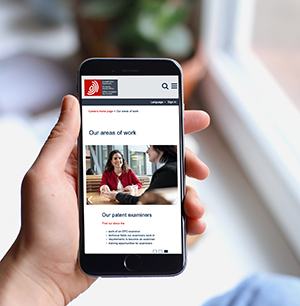 Last year also saw the relaunch of our new jobs and career website, showcasing the EPO as an international employer of choice.
By giving the website a responsive design, we also optimised the browsing experience for mobile device users.
Last year also saw the relaunch of our new jobs and career website, showcasing the EPO as an international employer of choice.
By giving the website a responsive design, we also optimised the browsing experience for mobile device users.
To create a more agile recruitment process with shorter lead times, we also built up sustainable candidate pipelines in the examiner area. In 2019 around 140 suitable candidates were identified, who can be contacted as business needs arise. There are plans to create similar pipelines for other areas in 2020.
To expand our talent pool, the EPO is also moving towards a more flexible language policy. By offering new recruits more time and support to enhance their language skills, we aim to appeal to a broader range of candidates, especially from under-represented member states.
Diversity is not only a key innovation driver, it also boosts organisational performance and staff engagement. The "diversity and inclusion" programme aims to enshrine diversity as an EPO value that is not only welcomed, but also actively encouraged and celebrated. In 2019, 475 managers completed diversity and inclusion training at the EPO, as well as eight staff representatives and 12 confidential counsellors.
To mark International Women's Day, we also launched a Women in the Lead mentoring programme pilot to support women aspiring to a leadership position. Its outcome was highly encouraging: 40% of participants applied for managerial posts or a new role within the organisation in 2019. It is even more encouraging to see that half of those candidates were successful (six were recruited as managers and five were appointed project managers). Building on this success story, we plan to upscale the programme by selecting 100 talented staff and 50 EPO leaders to act as their mentors in 2020.
In 2019 we also embarked on broadening the scope of our inclusion activities. In December a first draft of our disability policy was shared with the COHSEC. To increase the share of our employees from under-represented member states, we also sent our talent acquisition team to job fairs in those countries. To foster a more inclusive approach to recruitment, we also specifically targeted events for female engineers, LGBT and people living with a disability.
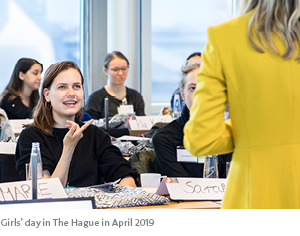 With an eye on tomorrow's talent, the EPO also organised Girls' days in The Hague and Munich for a total of 85 participants.
The events gave these 12-15 year-old girls insights into the work of a patent examiner.
With an eye on tomorrow's talent, the EPO also organised Girls' days in The Hague and Munich for a total of 85 participants.
The events gave these 12-15 year-old girls insights into the work of a patent examiner.
The Pan European Seal programme 2.0 builds on the achievements of recent years and aims to further increase the programme's attractiveness by moving to a first-job approach. It will support IP awareness, search, and technology transfer activities with NPOs, PATLIBs and TTOs across Europe.
The programme takes a holistic approach to securing sound, fair employment conditions for young graduates and extending partnerships with universities and other relevant external partners. Key improvements include proposals to expand and scale up the programme to increase our annual intake of trainees. The programme's geographical outreach will also be extended to include a larger number of universities with a track record for excellence in technical, science and engineering fields.
The Pan European Seal traineeship programme, which entered its fifth year at the EPO in 2019, now covers 77 partner universities from 33 member states and 2 extension states. Last year six countries were represented in the programme for the first time: Bulgaria, Cyprus, Greece, Luxembourg, Romania and Slovakia.
A total of 51 seals (including 13 who are working with examiners) arrived at the EPO in September 2019 taking the total number of Pan-European Seal admitted to the programme to date to over 400.
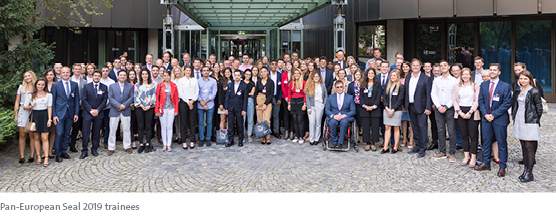
The EPO's talent development strategy takes a holistic and coherent approach to the professional and personal development of all our staff. Aligning individual professional development with the EPO's strategy is the guiding principle of our talent development operations.

We continued to transform and modernise our talent development operations in 2019. Thanks to new, state-of-the-art online learning platforms like LinkedIn Learning, our staff can now access a wide variety of training courses on topics ranging from coding and artificial intelligence to leadership and well-being.
A new business IT (BIT) programme was also deployed in 2019 featuring learning journeys for multiple critical roles. These journeys maximise participants' acquisition of technical, soft and leadership skills via blended activities delivered via a mix of channels, with a strong emphasis on online learning. Existing programmes for examiners and formalities officers continued to offer staff initial and advanced learning opportunities.
In terms of leadership development, the focus in 2019 was on topics like diversity and inclusion, self-management skills and
the EPO leadership model.
Internal mobility
Professional mobility creates opportunities for staff to develop and boosts their engagement levels. In 2019, a total of 69 internal vacancies and 67 internal/external job mobility opportunities were published, resulting in 1 467 applications. To foster internal job mobility, a total of 10 job fairs were organised in 2019 to recruit formalities officers, examiners and team managers at the EPO's various sites.
Additional job fairs were organised to hire administrative employees for human resources (HR), the Boards of Appeal (BoA) and quality audit staff. These events gave interested staff an opportunity to familiarise themselves with roles and learn more about development support via direct discussions with senior managers and our HR specialists. Special information sessions were also organised to recruit project managers and the 'speed interview' concept was successfully tested.
Work-life balance
To increase the EPO's attractiveness as an employer and offer staff greater flexibility in striking a healthy work-life balance, we launched a pilot scheme on ad hoc teleworking in 2019. This complemented our existing part-time homeworking (PTHW) scheme for staff. Ad hoc teleworking enables staff to request to work away from the EPO's premises for short periods of time, either occasionally or on an ad hoc basis. The pilot was run for around 400 managers and staff. A survey of participants highlighted the positive impact of ad hoc teleworking on staff and their work-life balance.
SP2023 set out a vision for the future of the EPO's buildings with three clear objectives: to provide a modern, sustainable and healthy working environment, to realise long-term financial gains and to provide environmentally sustainable, energy-efficient buildings. A building investment programme ensures coherence, alignment and synergies between these objectives at the EPO's sites across Europe.
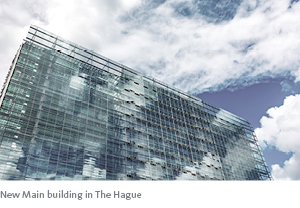 While the programme covers almost all of the buildings owned or rented by the EPO, the extent of the works spans from constructing
a completely new building (as in The Hague), to performing extensive renovations (in the PschorrHöfe, Isar building and PschorrHöfe
garage in Munich, as well as in the Hinge canteen in The Hague and in Berlin). The programme was approved in principle by
the Administrative Council in December 2019.
While the programme covers almost all of the buildings owned or rented by the EPO, the extent of the works spans from constructing
a completely new building (as in The Hague), to performing extensive renovations (in the PschorrHöfe, Isar building and PschorrHöfe
garage in Munich, as well as in the Hinge canteen in The Hague and in Berlin). The programme was approved in principle by
the Administrative Council in December 2019.
By the end of 2019 project managers were appointed for all projects scheduled to start in 2020 and an external consultancy was contracted to prepare the projects related to the Isar building and the PschorrHöfe garage.
The general philosophy of the programme is to define common EPO-wide technical specifications or functional requirements, which will subsequently be rolled out to all projects. An EPO multi-disciplinary project group began to develop a future workplace concept for the EPO with the support of a specialised consultant. By the end of 2019 the project group had already completed an "as is" analysis.
Co-operation and collaboration will be key success factors, ensuring that the programme delivers state-of-the-art workplaces that satisfy all of their users' needs. To this end, a change management strategy was formulated that involves all relevant stakeholders.

While the focus in 2019 was largely on the SP2023 building investment programme, other important, albeit smaller scale, projects were completed, including:
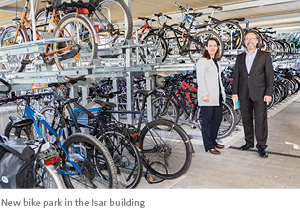
In response to users' requests, a growing number of areas were remodelled in 2019 to create a more open and collaborative set-up. This paves the way for the modern working environment that will be delivered by the building investment programme in the future.
Corporate communication plays a key role in strengthening corporate culture. The "Strengthen corporate culture" programme aims to:
In 2019, work commenced on the foundations of the programme, and some milestones were reached towards the end of the year. In December, a new principal directorate (PD) Communication was created, reporting directly to the President. The new organisational unit brings together external, internal communication and graphic design staff. Uniting these communication experts in one principal directorate will help us to tap synergies and increase the quality and timeliness of our information delivery.
The new structure features two directorates, "channel management" and "content creation". In 2020 we will focus on further developing our communication channels and contents and aligning them with industry best practice. More specifically, we will focus on empowering staff to act as multipliers for the EPO's internal and external communication activities. At the end of 2019 we launched daily team exchanges in a new newsroom format to help identify and act on topics of pertinence and importance.
Lastly, a mandate for PD Communication was established, charging it with all of the EPO's corporate communication, including strategic events. The new unit is now formally responsible for developing the EPO's corporate culture, protecting its external reputation and creating an inspiring corporate brand. Within this mandate, PD Communication acts as strategic communication advisor to senior management and ensures consistent, accurate and timely communication across all channels and target audiences.
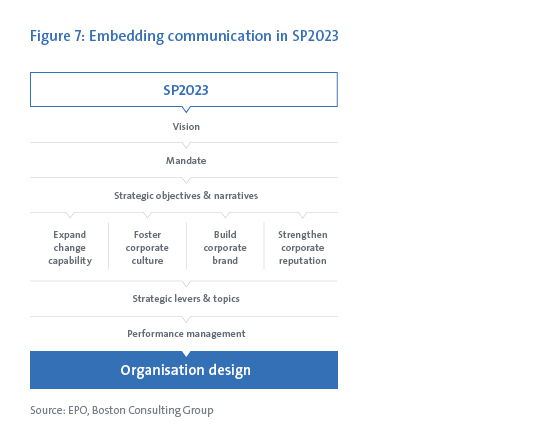
The EPO's Strategic Plan clearly states its commitment to forging constructive social relations with all internal stakeholders by engaging in meaningful dialogue based on trust and respect. In 2019 we developed several channels for social dialogue with staff across the office and their representatives.
At an individual level, the one-to-one meetings between staff members and the President, initiated at the beginning of his mandate continued until early 2019. The 1000th meeting took place in February 2019. These meetings were complemented by focus group meetings with staff and targeted discovery sessions with managers on specific topics of high interest.
The results of the office-wide staff engagement survey, conducted in February, were also evaluated and cascaded-down to each
directorate in the first half of 2019. Action plans were drawn up featuring specific measures to improve staff engagement
across the board (for more detailed information, see the "Engagement report").
Over 100 meetings were held at various levels of the office between all social partners and senior managers last year. In
addition to meetings of statutory bodies like the General Consultative Committee, the President attended three meetings with
the Central Staff Committee in 2019. Discussions on a possible revision of the rules pertaining to strike were initiated with
our two unions, SUEPO and the FFPE-EPO. The key channels for social dialogue were undoubtedly the various joint working groups,
which were convened to discuss and improve our rules and regulations.
These in-depth discussions resulted in the adoption of three circulars at the end of 2019. These new circulars on resources and facilities for staff representatives, guidelines on performance development, and professional incompetence were reviewed by the General Consultative Committee, and subsequently adopted in December 2019. In response to staff feedback on the transition to the new career system, the President agreed to grant an exceptional one-off pensionable reward to around 460 staff members who have not received a step or promotion since the introduction of the new career system.
Another key topic on the social agenda in 2019 was the first phase of a Financial Study performed by external consultants, which was finalised at the beginning of May. The study's findings revealed that the EPO is facing a significant funding gap. Several proposals on how to bridge this gap were put forward by both the Office and its staff representatives. All of the proposals were discussed in detail by a special finance working group composed of senior management and staff representatives. The working group held highly constructive meetings in November and December 2019. Discussions were completed in the first quarter of 2020.
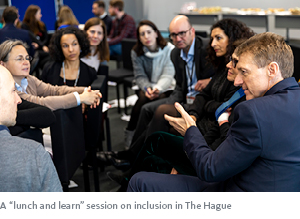 Lastly, the EPO's efforts to address past grievances through discussion and amicable settlements continued to bear fruits.
Of the 665 cases opened to amicable settlement in 2019, 541 cases have now been closed and 39% were concluded with individual
settlements. These figures include the settlements agreed with staff representatives and/or SUEPO officials: out of the 10
pending cases, 6 were resolved successfully in 2019, and discussions are ongoing for the other cases. These outcomes clearly
show that the EPO is successfully moving steadily towards a culture of dialogue and amicable settlement.
Lastly, the EPO's efforts to address past grievances through discussion and amicable settlements continued to bear fruits.
Of the 665 cases opened to amicable settlement in 2019, 541 cases have now been closed and 39% were concluded with individual
settlements. These figures include the settlements agreed with staff representatives and/or SUEPO officials: out of the 10
pending cases, 6 were resolved successfully in 2019, and discussions are ongoing for the other cases. These outcomes clearly
show that the EPO is successfully moving steadily towards a culture of dialogue and amicable settlement.